Fleurs du Mal Magazine


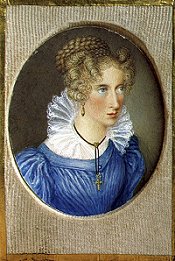
Annette von Droste-Hülshoff
(1797-1848)
Der Knabe im Moor
O schaurig ist’s übers Moor zu gehn,
Wenn es wimmelt vom Heiderauche,
Sich wie Phantome die Dünste drehn
Und die Ranke häkelt am Strauche,
Unter jedem Tritte ein Quellchen springt,
Wenn aus der Spalte es zischt und singt! –
O schaurig ist’s übers Moor zu gehn,
Wenn das Röhricht knistert im Hauche!
Fest hält die Fibel das zitternde Kind
Und rennt als ob man es jage;
Hohl über die Fläche sauset der Wind –
Was raschelt drüben am Hage?
Das ist der gespenstige Gräberknecht,
Der dem Meister die besten Torfe verzecht;
Hu, hu, es bricht wie ein irres Rind!
Hinducket das Knäblein zage.
Vom Ufer starret Gestumpf hervor,
Unheimlich nicket die Föhre,
Der Knabe rennt, gespannt das Ohr,
Durch Riesenhalme wie Speere;
Und wie es rieselt und knittert darin!
Das ist die unselige Spinnerin,
Das ist die gebannte Spinnlenor’,
Die den Haspel dreht im Geröhre!
Voran, voran, nur immer im Lauf,
Voran als woll’ es ihn holen!
Vor seinem Fuße brodelt es auf,
Es pfeift ihm unter den Sohlen
Wie eine gespenstige Melodei;
Das ist der Geigemann ungetreu,
Das ist der diebische Fiedler Knauf,
Der den Hochzeitheller gestohlen!
Da birst das Moor, ein Seufzer geht
Hervor aus der klaffenden Höhle;
Weh, weh, da ruft die verdammte Margret:
»Ho, ho, meine arme Seele!«
Der Knabe springt wie ein wundes Reh;
Wär’ nicht Schutzengel in seiner Näh’,
Seine bleichenden Knöchelchen fände spät
Ein Gräber im Moorgeschwele.
Da mählich gründet der Boden sich,
Und drüben, neben der Weide,
Die Lampe flimmert so heimatlich,
Der Knabe steht an der Scheide.
Tief atmet er auf, zum Moor zurück
Noch immer wirft er den scheuen Blick:
Ja, im Geröhre war’s fürchterlich,
O schaurig war’s in der Heide!
Annette von Droste-Hülshoff poetry
fleursdumal.nl magazine
More in: Archive C-D, CLASSIC POETRY
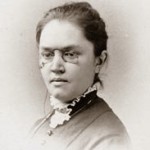
Katharine Lee Bates
(1859 – 1929)
Matthew Arnold
On Hearing Him Read His Poems
In Boston
A stranger, schooled to gentle arts,
He stept before the curious throng;
His path into our waiting hearts
Already paved by song.
Full well we knew his choristers,
Whose plaintive voices haunt our rest,
Those sable-vested harbingers
Of melancholy guest.
We smiled on him for love of these,
With eyes that swift grew dim to scan
Beneath the veil of courteous ease
The faith-forsaken man.
To his wan gaze the weary shows
And fashions of our vain estate,
Our shallow pain and false repose,
Our barren love and hate,
Are shadows in a land of graves,
Where creeds, the bubbles of a dream,
Flash each and fade, like melting waves
Upon a moonlight stream.
Yet loyal to his own despair,
Erect beneath a darkened sky,
He deems the austerest truth more fair
Than any gracious lie;
And stands, heroic, patient, sage,
With hopeless hands that bind the sheaf,
Claiming God’s work with His wage,
The bard of unbelief.
Katharine Lee Bates poetry
fleursdumal.nl magazine
More in: Archive A-B, CLASSIC POETRY
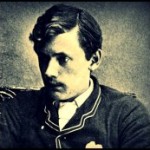
Ernest Dowson
(1867-1900)
Benedictio Domini
Without, the sullen noises of the street!
The voice of London, inarticulate,
Hoarse and blaspheming, surges in to meet
The silent blessing of the Immaculate.
Dark is the church, and dim the worshippers,
Hushed with bowed heads as though by some old spell,
While through the incense-laden air there stirs
The admonition of a silver bell.
Dark is the church, save where the altar stands,
Dressed like a bride, illustrious with light,
Where one old priest exalts with tremulous hands
The one true solace of man’s fallen plight.
Strange silence here; without, the sounding street
Heralds the world’s swift passage to the fire;
O Benediction, perfect and complete!
When shall men cease to suffer and desire?
Ernest Dowson poetry
fleursdumal.nl magazine
More in: Archive C-D, Dowson, Ernest
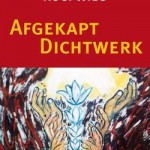 Na een lang ziekbed is op woensdag 15 juli 2015, in zijn woonplaats Amsterdam, de dichter, schrijver, beeldend kunstenaar en muzikant Rogi Wieg overleden.
Na een lang ziekbed is op woensdag 15 juli 2015, in zijn woonplaats Amsterdam, de dichter, schrijver, beeldend kunstenaar en muzikant Rogi Wieg overleden.
Rogi Wieg (1962) debuteerde als dichter in 1981. Zijn ouders waren Hongaarse vluchtelingen die zich in 1957 in Nederland hebben gevestigd.
Wieg werd, vanwege ernstige depressies, regelmatig opgenomen in psychiatrische ziekenhuizen en deed enkele pogingen tot zelfmoord. Zijn aanvraag voor euthanasie vanwege psychisch lijden werd onlangs gehonoreerd.
Zo zal ik niet sterven, maar ga ik
alleen een beetje dood.
(Rogi Wieg, 15 mei 2015)
fleursdumal.nl magazine
More in: Archive W-X, In Memoriam, Wieg, Rogi
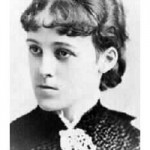
Edith Wharton
(1862-1937)
Life
Nay, lift me to thy lips, Life, and once more
Pour the wild music through me—
I quivered in the reed-bed with my kind,
Rooted in Lethe-bank, when at the dawn
There came a groping shape of mystery
Moving among us, that with random stroke
Severed, and rapt me from my silent tribe,
Pierced, fashioned, lipped me, sounding for a voice,
Laughing on Lethe-bank—and in my throat
I felt the wing-beat of the fledgeling notes,
The bubble of godlike laughter in my throat.
Such little songs she sang,
Pursing her lips to fit the tiny pipe,
They trickled from me like a slender spring
That strings frail wood-growths on its crystal thread,
Nor dreams of glassing cities, bearing ships.
She sang, and bore me through the April world
Matching the birds, doubling the insect-hum
In the meadows, under the low-moving airs,
And breathings of the scarce-articulate air
When it makes mouths of grasses—but when the sky
Burst into storm, and took great trees for pipes,
She thrust me in her breast, and warm beneath
Her cloudy vesture, on her terrible heart,
I shook, and heard the battle.
But more oft,
Those early days, we moved in charmed woods,
Where once, at dusk, she piped against a faun,
And one warm dawn a tree became a nymph
Listening; and trembled; and Life laughed and passed.
And once we came to a great stream that bore
The stars upon its bosom like a sea,
And ships like stars; so to the sea we came.
And there she raised me to her lips, and sent
One swift pang through me; then refrained her hand,
And whispered: “Hear—” and into my frail flanks,
Into my bursting veins, the whole sea poured
Its spaces and its thunder; and I feared.
We came to cities, and Life piped on me
Low calls to dreaming girls,
In counting-house windows, through the chink of gold,
Flung cries that fired the captive brain of youth,
And made the heavy merchant at his desk
Curse us for a cracked hurdy-gurdy; Life
Mimicked the hurdy-gurdy, and we passed.
We climbed the slopes of solitude, and there
Life met a god, who challenged her and said:
“Thy pipe against my lyre!” But “Wait!” she laughed,
And in my live flank dug a finger-hole,
And wrung new music from it. Ah, the pain!
We climbed and climbed, and left the god behind.
We saw the earth spread vaster than the sea,
With infinite surge of mountains surfed with snow,
And a silence that was louder than the deep;
But on the utmost pinnacle Life again
Hid me, and I heard the terror in her hair.
Safe in new vales, I ached for the old pang,
And clamoured “Play me against a god again!”
“Poor Marsyas-mortal—he shall bleed thee yet,”
She breathed and kissed me, stilling the dim need.
But evermore it woke, and stabbed my flank
With yearnings for new music and new pain.
“Another note against another god!”
I clamoured; and she answered: “Bide my time.
Of every heart-wound I will make a stop,
And drink thy life in music, pang by pang,
But first thou must yield the notes I stored in thee
At dawn beside the river. Take my lips.”
She kissed me like a lover, but I wept,
Remembering that high song against the god,
And the old songs slept in me, and I was dumb.
We came to cavernous foul places, blind
With harpy-wings, and sulphurous with the glare
Of sinful furnaces—where hunger toiled,
And pleasure gathered in a starveling prey,
And death fed delicately on young bones.
“Now sing!” cried Life, and set her lips to me.
“Here are gods also. Wilt thou pipe for Dis?”
My cry was drowned beneath the furnace roar,
Choked by the sulphur-fumes; and beast-lipped gods
Laughed down on me, and mouthed the flutes of hell.
“Now sing!” said Life, reissuing to the stars;
And wrung a new note from my wounded side.
So came we to clear spaces, and the sea.
And now I felt its volume in my heart,
And my heart waxed with it, and Life played on me
The song of the Infinite. “Now the stars,” she said.
Then from the utmost pinnacle again
She poured me on the wild sidereal stream,
And I grew with her great breathings, till we swept
The interstellar spaces like new worlds
Loosed from the fiery ruin of a star.
Cold, cold we rested on black peaks again,
Under black skies, under a groping wind;
And Life, grown old, hugged me to a numb breast,
Pressing numb lips against me. Suddenly
A blade of silver severed the black peaks
From the black sky, and earth was born again,
Breathing and various, under a god’s feet.
A god! A god! I felt the heart of Life
Leap under me, and my cold flanks shook again.
He bore no lyre, he rang no challenge out,
But Life warmed to him, warming me with her,
And as he neared I felt beneath her hands
The stab of a new wound that sucked my soul
Forth in a new song from my throbbing throat.
“His name—his name?” I whispered, but she shed
The music faster, and I grew with it,
Became a part of it, while Life and I
Clung lip to lip, and I from her wrung song
As she from me, one song, one ecstasy,
In indistinguishable union blent,
Till she became the flute and I the player.
And lo! the song I played on her was more
Than any she had drawn from me; it held
The stars, the peaks, the cities, and the sea,
The faun’s catch, the nymph’s tremor, and the heart
Of dreaming girls, of toilers at the desk,
Apollo’s challenge on the sunrise slope,
And the hiss of the night-gods mouthing flutes of hell—
All, to the dawn-wind’s whisper in the reeds,
When Life first came, a shape of mystery,
Moving among us, and with random stroke
Severed, and rapt me from my silent tribe.
All this I wrung from her in that deep hour,
While Love stood murmuring: “Play the god, poor grass!”
Now, by that hour, I am a mate to thee
Forever, Life, however spent and clogged,
And tossed back useless to my native mud!
Yea, groping for new reeds to fashion thee
New instruments of anguish and delight,
Thy hand shall leap to me, thy broken reed,
Thine ear remember me, thy bosom thrill
With the old subjection, then when Love and I
Held thee, and fashioned thee, and made thee dance
Like a slave-girl to her pipers—yea, thou yet
Shalt hear my call, and dropping all thy toys
Thou’lt lift me to thy lips, Life, and once more
Pour the wild music through me—
Edith Wharton poetry
fleursdumal.nl magazine
More in: Archive W-X, CLASSIC POETRY
 De jongen begreep niet goed wat het geschreeuw rond zijn bed te betekenen had. Hij merkte dat Céleste zijn hand vasthield. Hij herkende haar adem. De geur van haar huid. Hij legde zijn hoofd wat dichterbij om haar beter te kunnen ruiken. Even voelde hij zich niet meer zo eenzaam, omdat ze tegen hem praatte, vlak bij zijn oor.
De jongen begreep niet goed wat het geschreeuw rond zijn bed te betekenen had. Hij merkte dat Céleste zijn hand vasthield. Hij herkende haar adem. De geur van haar huid. Hij legde zijn hoofd wat dichterbij om haar beter te kunnen ruiken. Even voelde hij zich niet meer zo eenzaam, omdat ze tegen hem praatte, vlak bij zijn oor.
Nu de kraaien op de grond knielden en Céleste bij het kind was, zag de buizerd de gelegenheid schoon om ook weer eens dicht bij de jongen te zijn. Hij vloog naar het bed en streek neer op het hoofdeind. Pikte naar de haren van de jongen. Alsof hij zeggen wilde: Hé, joh, kom eens uit je nest. Het is hoog tijd om naar het bos te gaan. De konijnen zullen wel lachen. We hebben ze de laatste tijd te veel laten lachen, omdat jij maar altijd tussen de lakens ligt. Nu zullen we ze leren. En waarom voer je de adder niet meer? Hoe vaak denk je dat ik de laatste tijd met een zooi muizen op je heb zitten wachten? Is dat beest gecrepeerd? En de kat? Waar heb je de kat? De jongen begreep de vogel. Hij trachtte overeind te komen, wilde zijn bed verlaten om met zijn buizerd naar het bos te gaan. Zijn ogen werden groot. Hij probeerde zijn arm te strekken om het beest op zijn pols te zetten. Met zijn andere hand trok hij Céleste aan de arm, om haar te beduiden dat ze mee moest gaan. Koortsig zocht hij naar de andere dieren, die hij ook wilde meenemen, zoals dat gebruikelijk was. Terwijl de pastoor en de kraaien de gebeden verrichtten, merkte de jongen dat er nog warmte om hem was. En toen zijn hoofd op het kussen terugviel, ging hij in zijn droom op weg. Dacht hij met Céleste door de velden te hollen? Wie was het eerst bij het bos? De buizerd vloog voor hem uit. De hond sprong om hem heen. De adder lag in een knoop om zijn nek. De kat schoot zo nu en dan uit de struiken tevoorschijn. In het bos lagen ze bij een beek. Ze plukten bramen. De hond joeg alle kleine dieren op. Soms was het moeilijk de hond bij de kat vandaan te houden. En ook de adder deed zijn best. Ging al alleen op verkenning uit, rond het huis, maar kwam toch nog terug. De jongen vertelde Céleste honderduit. Vooral over zijn dieren. Hij wist alles over hun gedrag. Hij kende hun goede maar ook hun valse trekken. Hij wist de eigenschappen te onderscheiden die de natuur aan de beesten had meegegeven, zodat ze zich in stand konden houden. Want in werkelijkheid lag het niet in de aard van zijn beesten om van elkaar te houden. Alleen híj kon hen bij elkaar houden. Hij was de bindende kracht. Desnoods kon je een hond met een kat laten spelen. Maar een kat moest niks hebben van een buizerd. En de buizerd had de pest aan de hond. En de adder? Die had de pest aan allemaal. Céleste voelde aan wat de jongen meemaakte in zijn droom. Hij leek nu rustig. Soms leek het zelfs of er een lach op zijn gezicht doorbrak. Pastoor Joachim Andrades gebedsmachine liep stuk toen hij de bakker met een armvol verse broden naar buiten zag komen. Die geurden zo lekker dat het water hem in de mond liep. Bijna teleurgesteld zag hij hoe de bakker ze in zijn wagen laadde. Hij voelde hoe de eeuwige honger knaagde aan zijn pens.
Ton van Reen: Landverbeuren (44)
wordt vervolgd
fleursdumal.nl magazine
More in: - Landverbeuren, Reen, Ton van
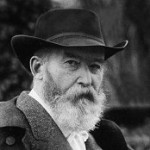
Wilhelm Busch
(1832-1908)
Summa summarum
Sag, wie wär es, alter Schragen,
Wenn du mal die Brille putztest,
Um ein wenig nachzuschlagen,
Wie du deine Zeit benutztest.
Oft wohl hätten dich so gerne
Weiche Arme weich gebettet;
Doch du standest kühl von ferne,
Unbewegt, wie angekettet.
Oft wohl kam’s, daß du die schöne
Zeit vergrimmtest und vergrolltest,
Nur weil diese oder jene
Nicht gewollt, so wie du wolltest.
Demnach hast du dich vergebens
Meistenteils herumgetrieben;
Denn die Summe unsres Lebens
Sind die Stunden, wo wir lieben.
Wilhelm Busch poetry
fleursdumal.nl magazine
More in: Archive A-B, Archive A-B, CLASSIC POETRY, Galerie Deutschland, Wilhelm Busch
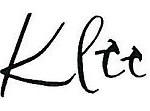
Paul Klee
(1879-1940)
Eins durch tausend
Ein
Tausend Schwein
steht in Pein
ohne neun
hundert neun
und neunzig sein
es gleichen Schwein
allein
Paul Klee Gedicht, 1928
fleursdumal.nl magazine
More in: Archive K-L, Expressionism, Klee, Paul
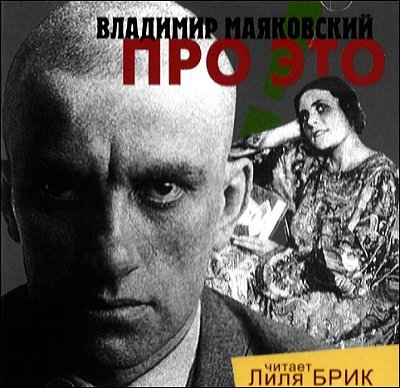
Vladimir Vladimirovitsj Majakovsky
Владимир Владимирович Маяковский
(1893-1930)
А вы могли бы?
Я сразу смазал карту будня,
плеснувши краску из стакана;
я показал на блюде студня
косые скулы океана.
На чешуе жестяной рыбы
прочел я зовы новых губ.
А вы
ноктюрн сыграть
могли бы
на флейте водосточных труб?
(1913)
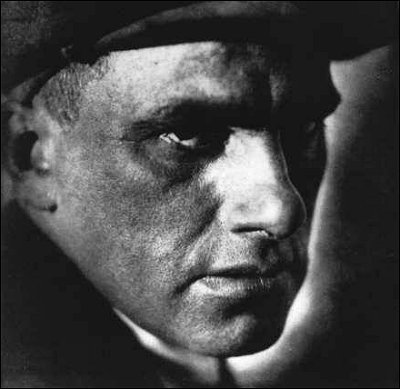

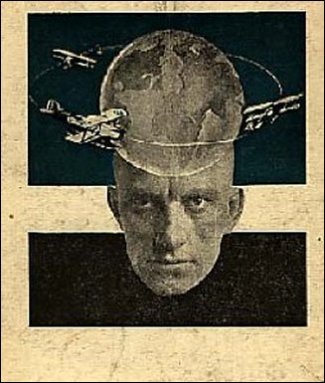
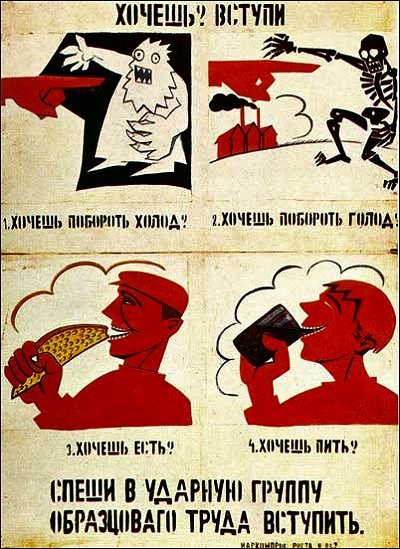
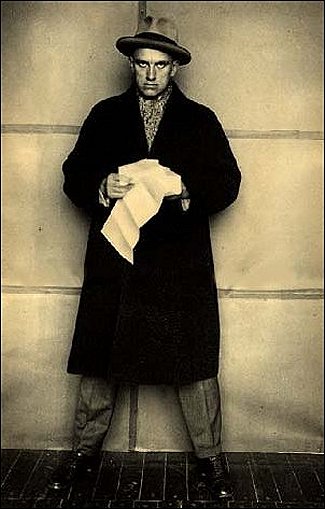
Vladimir Majakovsky poetry
fleursdumal.nl magazine
More in: Archive M-N, Constructivism, Majakovsky, Vladimir
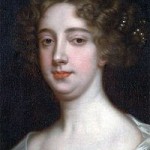
Aphra Behn
(1640 – 1689)
A Thousand Martyrs I Have Made
A thousand Martyrs I have made,
All sacrific’d to my desire;
A thousand Beauties have betray’d,
That languish in resistless Fire.
The untam’d Heart to hand I brought,
And fixt the wild and wandring Thought.
I never vow’d nor sigh’d in vain
But both, th false, were well receiv’d.
The Fair are pleas’d to give us pain,
And what they wish is soon believ’d.
And th I talked of Wounds and Smart,
Loves Pleasures only toucht my Heart.
Alone the Glory and the Spoil
I always Laughing bore away;
The Triumphs, without Pain or Toil,
Without the Hell, the Heav’n of Joy.
And while I thus at random rove
Despise the Fools that whine for Love.
Aphra Behn poetry
fleursdumal.nl magazine
More in: Archive A-B, CLASSIC POETRY
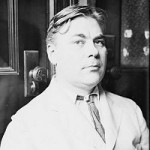
Don Marquis
(1878 – 1937)
Dickens
“The only book that the party had was a volume of Dickens.
During the six months that they lay in the cave which they
had hacked in the ice, waiting for spring to come, they read
this volume through again and again.”—From a
newspaper report of an antarctic expedition.
Huddled within their savage lair
They hearkened to the prowling wind;
They heard the loud wings of despair . . .
And madness beat against the mind. . . .
A sunless world stretched stark outside
As if it had cursed God and died;
Dumb plains lay prone beneath the weight
Of cold unutterably great;
Iron ice bound all the bitter seas,
The brutal hills were bleak as hate. . . .
Here none but Death might walk at ease!
Then Dickens spoke, and, lo! the vast
Unpeopled void stirred into life;
The dead world quickened, the mad blast
Hushed for an hour its idiot strife
With nothingness. . . .
And from the gloom,
Parting the flaps of frozen skin,
Old friends and dear came trooping in,
And light and laughter filled the room. . . .
Voices and faces, shapes beloved,
Babbling lips and kindly eyes,
Not ghosts, but friends that lived and moved . . .
They brought the sun from other skies,
They wrought the magic that dispels
The bitterer part of loneliness . . .
And when they vanished each man dreamed
His dream there in the wilderness. . . .
One heard the chime of Christmas bells,
And, staring down a country lane,
Saw bright against the window-pane
The firelight beckon warm and red. . . .
And one turned from the waterside
Where Thames rolls down his slothful tide
To breast the human sea that beats
Through roaring London’s battered streets
And revel in the moods of men. . . .
And one saw all the April hills
Made glad with golden daffodils,
And found and kissed his love again. . . .
. . . . . .
By all the troubled hearts he cheers
In homely ways or by lost trails,
By all light shed through all dark years
When hope grows sick and courage quails,
We hail him first among his peers;
Whether we sorrow, sing, or feast,
He, too, hath known and understood—
Master of many moods, high priest
Of mirth and lord of cleansing tears!
Don Marquis poetry
fleursdumal.nl magazine
More in: Archive M-N, Charles Dickens, CLASSIC POETRY
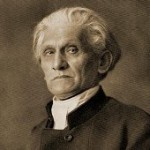
Stefan George
(1868-1933)
Im Park
Rubinen perlen schmücken die fontänen,
Zu boden streut sie fürstlich jeder strahl,
In eines teppichs seidengrünen strähnen
Verbirgt sich ihre unbegrenzte zahl.
Der dichter dem die vögel angstlos nahen
Träumt einsam in dem weiten schattensaal ..
Die jenen wonnetag erwachen sahen
Empfinden heiss von weichem klang berauscht,
Es schmachtet leib und leib sich zu umfahen.
Der dichter auch der töne lockung lauscht.
Doch heut darf ihre weise nicht ihn rühren
weil er mit seinen geistern rede tauscht:
Er hat den griffel der sich sträubt zu führen.
Stefan George Gedicht
fleursdumal.nl magazine
More in: Archive G-H, George, Stefan
Thank you for reading Fleurs du Mal - magazine for art & literature